Helping the Prez, Greening the Rez
Air Date: Week of January 16, 2009
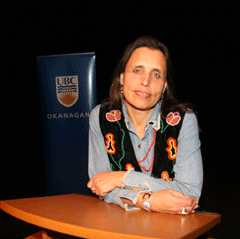
Winona LaDuke, rural development economist, environmentalist, and member of the Ojibwe tribe of Minnesota. (Courtesy of Honor the Earth)
Armed with big potential for wind and solar generation, Native America says it's ready to help Barack Obama build a green economy. A policy statement, signed by 250 tribes and tribal organizations and submitted to the new administration, outlines ways to tackle global warming while addressing unemployment and fuel poverty on tribal lands. Economist Winona LaDuke, director of Honor the Earth, talks with host Steve Curwood about the need to develop tribal economies without degrading tribal lands and beliefs.
Transcript
CURWOOD: When it comes to U.S. energy policy and Native Americans, the record's pretty poor. Uranium and coal mining have brought pollution to native communities and lands - but relatively few jobs - and rising sea waters due to fossil fuel consumption are forcing native villages in Alaska to abandon their coastal lands.
But now that Barack Obama has brought his promise of a lean, clean economy to the White House, many tribes are feeling hopeful. So hopeful, in fact, that a green policy statement representing more than 200 tribes and tribal organizations has been submitted to the Obama team.
Winona LaDuke is a rural development economist and writer - you might know her as Ralph Nader's running mate on the Green Party ticket in the 2000 presidential elections. She now directs Honor the Earth, a non-profit that helped draw up the green petition, which outlines what Native America needs from the Obama administration, and what the Obama administration needs from Native America.

Winona LaDuke, rural development economist, environmentalist, and member of the Ojibwe tribe of Minnesota. (Courtesy of Honor the Earth)
LADUKE: We have this vast potential for renewable energy. The best potential in the whole country comes from Indian tribes and Indian tribal communities. We have been the most impacted by the last energy economy of anyone. And what we need to do is to capitalize the next energy economy in Indian country on terms that are just and are fair. So that we aren't selling our wind rights out to major corporations, you know, and just receiving a pittance. I'm relatively aware of the fact that 1) the Obama administration has inherited a huge mess and 2) the Obama administration is full of vital energy to make a change. So we have infused our strategy, saying that you want a green economy? This is what a green economy looks like in Indian Country, and this is how you would do it.
CURWOOD: So what is it that you're asking the Obama administration to do?
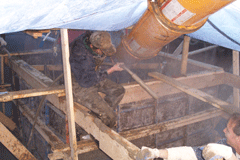
Members of the Ojibwe tribe pour the foundation for a 75 kW wind turbine on the White Earth Reservation. (Courtesy of Honor the Earth)
LADUKE: What we are asking the Obama administration to do is 1) increase tribal capacity in training to create a work force that is able to move into renewable energy through financing. We are asking them for energy assistance, efficiency work, because most of our homes are trailers on our reservations, and, in addition to that, homes that are already up are highly inefficient. So in order to reduce fuel poverty in Indian country, we have to have efficient homes. We are asking for renewable production refund for tribal projects that can't utilize tax credits in order to ensure that tribal governments are able to capitalize renewable energy in Indian Country. We are asking for access to the federal grid in ways that will address tribal ability to bring our projects online at a level that is meaningful both for tribal economies and to address climate change.
CURWOOD: Now, your organization also made it very clear that you don't want to see the U.S. pursuing nuclear energy and what's been called clean coal. Why is that?
LADUKE: Well clean coal doesn't exist. You can't wash it enough, you can't – strip mining or blowing off the top of a mountain is not clean. There's no way to clean up coal. And so, we just think that we shouldn't waste our time and the billions or trillions of dollars that it would take to try to sequester something for forever – because that is what you would have to do is for forever. So just leave it in the ground. Nuclear power – our tribes have been heavily impacted and are presently impacted by uranium mining. We are fighting uranium mining out in South Dakota and in Nebraska and all through the north. You know we have thousands of abandoned uranium mines and thousands of people who are impacted by radiation exposure. Nuclear is expensive, is dangerous and is not the answer to climate change. There is no way you can bring enough nuclear power plants on line in time to address climate change disasters. What we need to do is we need to put the money that would be wasted on clean coal and wasted on nuclear power into a full scale efficiency, renewable economy that treats people with dignity and doesn't treat people as second class citizens and assume that we can dump our waste in third world countries or in Indian reservations.
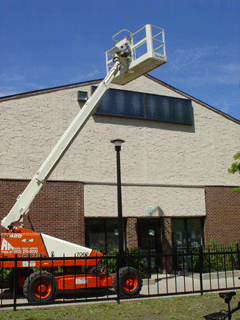
Installing solar panels at Little Earth in Minneapolis. (Courtesy of Honor the Earth, Photo: Aimee Loiselle)
CURWOOD: So, let's look at some specifics here Winona LaDuke. I understand about a hundred tribes have already done some feasibility studies to look at what could be done in terms of wind and solar energy generation. What are those numbers? What kind of potential are we looking at here?
LADUKE: So the United States needs to produce about 185,000 megawatts of green power in the next decade in order to address climate change. That is the reality. Tribal communities are probably in a position to produce about 120,000 megawatts of that. Between wind potential, they're saying that our tribal communities have the potential to produce about one third of present installed U.S. electrical capacity to massive solar projects that are, you know, tribal projects and have the potential to feed into the present grids and create a green energy that will help this country address climate change. So, we are the people of color with land and natural resources, that's what distinguishes us, aside from other things, from other communities of color. And on that land, we have some of the windiest places in the country. Go figure how that happened – but the northern plains – you know, even in my reservation we have very high wind potential. I just finished last week putting up the foundation for a wind turbine at my office in Callaway, Minnesota. It's a 75 kilowatt wind turbine. My tribe is looking at – and other tribes in our area are looking at about four more megawatts of power coming online probably within the next two to three years.
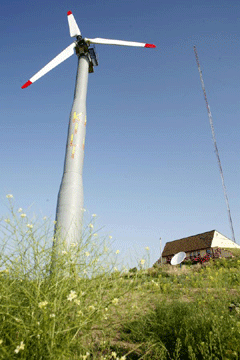
A wind turbine at the Pine Ridge Reservation in South Dakota powers a Lakota radio station. (Courtesy of Honor the Earth, Photo: Keri Pickett)
CURWOOD: Certainly the need for economic development on Native lands is really as impressive as the renewable energy potential that you have with your very high unemployment rates. And I think, in fact, a lot of reservation households don't even have electricity. So to what extent do you think that green jobs, green infrastructure, green energy is gonna get those figures turned around, to make change that has yet to come to Indian Country some two hundred plus years into the life of this country?
LADUKE: I am very hopeful. That is to say, I look at my own reservation the White Earth reservation in northern Minnesota – on my reservation, one quarter of our money is spent on energy. All of that money basically goes to off reservation vendors whether it is for electricity or whether it is for fuel. You know a quarter of our income is a substantial economy for our reservation and for any reservation. And so our strategy is to replicate what we are doing in White Earth, you know, nationally, and say instead of outsourcing, we can re-localize a good portion of our energy economy. But we need the jobs in our communities. We need joint ownership or ownership of the wind power production and the solar power productions so that the revenues return to our tribal communities. We need to be employed in those, because we have 60% unemployment on my reservation, and, you know, the average age of a Native person is, you know, like 20, 21 years of age and you could either send my young man off to jail or you could employ him or send him to the military.
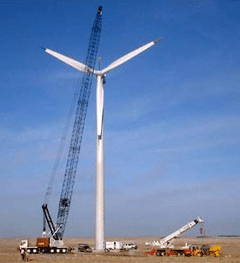
In 2003, the 750-kW turbine on the Rosebud Sioux reservation became the first commercial wind turbine to be installed, owned and operated by an American Indian tribe. (Courtesy of Intertribal Council on Utility Policy)
LADUKE: I think that the present time is good. My youngest son, his name is Gwaconamont Gasko (sp). And Gwaconamont in our language means when the wind shifts. And that is what is happening now; the wind is shifting. And we have a chance to do something great for the generations that have not yet arrived here. You know, we've battled for years to create a society which is not based on conquest, but is based on survival. And the Obama administration, with the intersection between the realities of a shrinking, unsustainable economy, climate change, fuel, poverty and peak oil, we have the chance to make an economy that will reaffirm a relationship to the land. And so, I'm very optimistic. The next economy will not affect our sacred sites, our rivers, our lakes, our mountains, because the next economy will not require their consumption.
CURWOOD: Winona LaDuke is the executive director of Honor the Earth, one of the Native American groups who drew up a green policy statement for the Obama administration and a former candidate for vice president of the United States under the banner of the Green Party. Winona, thanks so much for your time.
LADUKE: Thank you, Migwich (sp)
CURWOOD: Migwich (sp)
Links
Living on Earth wants to hear from you!
Living on Earth
62 Calef Highway, Suite 212
Lee, NH 03861
Telephone: 617-287-4121
E-mail: comments@loe.org
Newsletter [Click here]
Donate to Living on Earth!
Living on Earth is an independent media program and relies entirely on contributions from listeners and institutions supporting public service. Please donate now to preserve an independent environmental voice.
NewsletterLiving on Earth offers a weekly delivery of the show's rundown to your mailbox. Sign up for our newsletter today!
 Sailors For The Sea: Be the change you want to sea.
Sailors For The Sea: Be the change you want to sea.
 The Grantham Foundation for the Protection of the Environment: Committed to protecting and improving the health of the global environment.
The Grantham Foundation for the Protection of the Environment: Committed to protecting and improving the health of the global environment.
 Contribute to Living on Earth and receive, as our gift to you, an archival print of one of Mark Seth Lender's extraordinary wildlife photographs. Follow the link to see Mark's current collection of photographs.
Contribute to Living on Earth and receive, as our gift to you, an archival print of one of Mark Seth Lender's extraordinary wildlife photographs. Follow the link to see Mark's current collection of photographs.
 Buy a signed copy of Mark Seth Lender's book Smeagull the Seagull & support Living on Earth
Buy a signed copy of Mark Seth Lender's book Smeagull the Seagull & support Living on Earth

